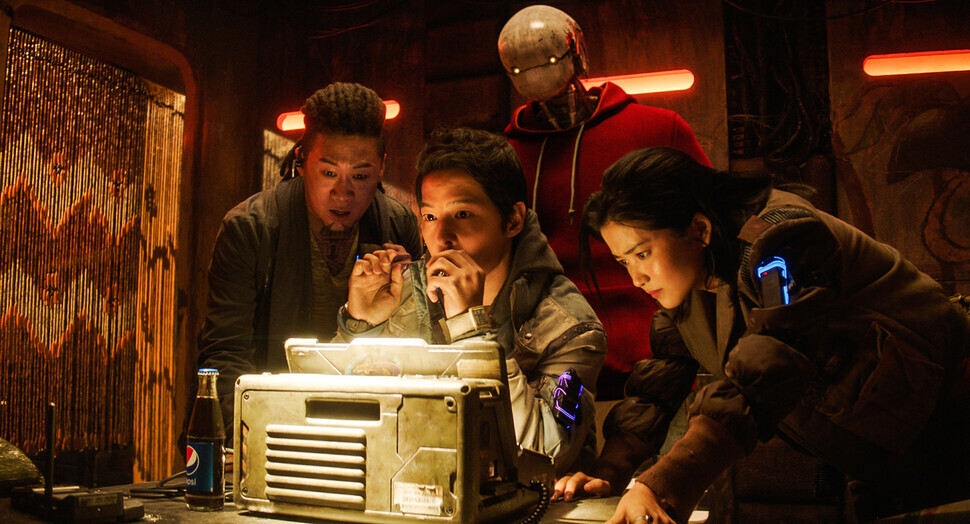hankyoreh
Links to other country sites 다른 나라 사이트 링크
[Column] “Space Sweepers” offers blueprint of multilingual future

“Space Sweepers,” a film by Jo Sung-hee, made its debut this month on Netflix. Korea’s first space-based sci-fi movie has drawn a lot of notice, topping most-viewed lists in many countries around the world.
Some of the most fascinating responses to the film have to do with its inclusion of Nigerian pidgin and Tagalog. Tade Thompson, a British author and psychiatrist who is the son of Yoruba immigrants, tweeted, “All right, I love Space Sweepers. Accurate Nigerian pidgin in a non-Nigerian movie? 5 stars immediately. Seriously, though, in terms of multicultural cast? This is the best movie.”
Many in the Philippines have also expressed their delight over the use of Tagalog in “Space Sweepers.”
In addition to the Korean language, “Space Sweepers” includes dialogue in Chinese, Arabic, Nigerian pidgin, Russian, English, French, Tagalog and Danish. The characters in the film have devices in their ears that automatically translate other people’s languages into their own.
So even though this is a Korean-language film, Korean speakers have to rely heavily on subtitles throughout the film. That’s not a big deal in South Korea, where foreign films have been shown with subtitles, rather than being dubbed, for decades now.
But in the US and countries in Europe, films are generally dubbed. When the South Korean film “Parasite” was released in the US, it was the first time many people had ever watched a film with subtitles. The experience of reading subtitles may have been a little uncomfortable for them.
Anyone who has watched Hollywood sci-fi films will have found themselves perplexed at how exactly aliens could be so good at English in those fictional universes. Despite their professed support of political correctness, diversity and inclusiveness of minorities of all stripes, Hollywood films have for the most part slotted in minorities for the sake of appearances in worlds still dominated by white people.
And those worlds have always been dominated by English. Linguistic equality has never been represented in mainstream films. But “Space Sweepers” offers a blend of many languages while filling both white collar and blue collar roles with people of various races.
We live in a world where English is the lingua franca. The English spoken by people from the non-English-speaking world is no longer officially called pidgin or “broken” English. (A pidgin is a hybrid language formed through a combination of the language spoken by the colonized people and the language spoken by the colonizers, whether English or something else.)
As English began to spread around the world and achieve universal status in the late 1990s, some began to assert that no form of English is superior to any other form. That was when the plural term “englishes” (with a small “e”) was coined, a concept that embraces not only British English and American English but also Konglish (English spoken by Koreans) and Chinglish (English as spoken by Chinese).
In due time, the concept of “English as a lingua franca,” or ELF, was developed. But in the ELF era, English has only gained more prestige. English is the language used to communicate more than 95% of important information about technology. Although the internet has extended around the world and smartphones are even used in the jungle, the most useful information is inaccessible without knowledge of English.
I sometimes read about monolingual English speakers describing bilingual people who are somewhat less fluent in English as being inferior or stupid. Those accounts are shocking to encounter, especially in a time when people are praised for being multilingual. Just as the status of bilingualism has changed from inferior to enviable over the past decades, the advent of automatic translation devices would change the status of speakers of specific languages.
From this point of view, it’s extremely important to imagine the linguistic environment that we’ll inhabit in the future. The scenario of linguistic equality portrayed by “Space Sweepers” is very suggestive in this regard. The film finally offers the blueprint of a future in which English is not the mainstream language.

By Joyce Park, English educator
Please direct comments or questions to [english@hani.co.kr]

Editorial・opinion
![[Editorial] Penalties for airing allegations against Korea’s first lady endanger free press [Editorial] Penalties for airing allegations against Korea’s first lady endanger free press](https://flexible.img.hani.co.kr/flexible/normal/500/300/imgdb/original/2024/0502/1817146398095106.jpg) [Editorial] Penalties for airing allegations against Korea’s first lady endanger free press
[Editorial] Penalties for airing allegations against Korea’s first lady endanger free press![[Editorial] Yoon must halt procurement of SM-3 interceptor missiles [Editorial] Yoon must halt procurement of SM-3 interceptor missiles](https://flexible.img.hani.co.kr/flexible/normal/500/300/imgdb/child/2024/0501/17145495551605_1717145495195344.jpg) [Editorial] Yoon must halt procurement of SM-3 interceptor missiles
[Editorial] Yoon must halt procurement of SM-3 interceptor missiles- [Guest essay] Maybe Korea’s rapid population decline is an opportunity, not a crisis
- [Column] Can Yoon steer diplomacy with Russia, China back on track?
- [Column] Season 2 of special prosecutor probe may be coming to Korea soon
- [Column] Park Geun-hye déjà vu in Yoon Suk-yeol
- [Editorial] New weight of N. Korea’s nuclear threats makes dialogue all the more urgent
- [Guest essay] The real reason Korea’s new right wants to dub Rhee a founding father
- [Column] ‘Choson’: Is it time we start referring to N. Korea in its own terms?
- [Editorial] Japan’s rewriting of history with Korea has gone too far
Most viewed articles
- 160% of young Koreans see no need to have kids after marriage
- 2Presidential office warns of veto in response to opposition passing special counsel probe act
- 3Months and months of overdue wages are pushing migrant workers in Korea into debt
- 4[Reporter’s notebook] In Min’s world, she’s the artist — and NewJeans is her art
- 5[Editorial] Penalties for airing allegations against Korea’s first lady endanger free press
- 6Japan says it’s not pressuring Naver to sell Line, but Korean insiders say otherwise
- 7OECD upgrades Korea’s growth forecast from 2.2% to 2.6%
- 8Hybe-Ador dispute shines light on pervasive issues behind K-pop’s tidy facade
- 9Inside the law for a special counsel probe over a Korean Marine’s death
- 10At heart of West’s handwringing over Chinese ‘overcapacity,’ a battle to lead key future industries